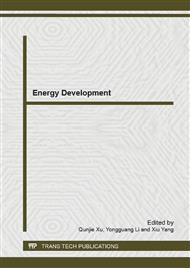p.766
p.770
p.774
p.780
p.784
p.793
p.797
p.803
p.807
The Analysis of Current Implementation Mechanism of Green Power
Abstract:
Energy is the material foundation to promote social progress and of humans survival. A large number of energy consumption has brought serious environmental problems. After Global Climate Summit in Copenhagen, The attention to the green-house gas emissions of our country from the international community grows day by day. Developing green power is vigorously an important way to reduce the emissions of greenhouse gases. However, the cost of green power is so high compared with the traditional fossil energy that green power cannot be promoted only depending on market mechanism. So the mechanism that supports green power should be established. Firstly the implementation of green power of foreign countries (mainly the United States and European Union countries) is analyzed, and its content includes implementation mechanism, the market main body and duties, policy, motivation, supervision, etc. Then the development of domestic green power is described in detail, and a comparative analysis is presented between foreign and domestic implementation of green power in various aspects. Now in our country, the provinces developing green power better are Jiangsu, Zhejiang, Shanghai, Beijing and so on. There are enough green-power resources, potential users in these regions. And with the excitation of national policy, the regions develop green power actively, laying foundation of implementation of green-power mechanism. Shanghai is now the first city of our country that implements mechanism of green power. After the analysis of the present implementation of green power, the deficiency and areas in need of improvement are presented, combined with Shanghais present green-power implementation mechanism, as well as the original national green-power implementation mechanism. And some policy suggestion is put forward for the recent national green-power development in finance, taxation, incentive etc, which analyses and improves the designation of green-power implementation mechanism, including the payments balance and the research of incentive mechanism.
Info:
Periodical:
Pages:
784-790
Citation:
Online since:
December 2013
Authors:
Keywords:
Price:
Сopyright:
© 2014 Trans Tech Publications Ltd. All Rights Reserved
Share:
Citation:


